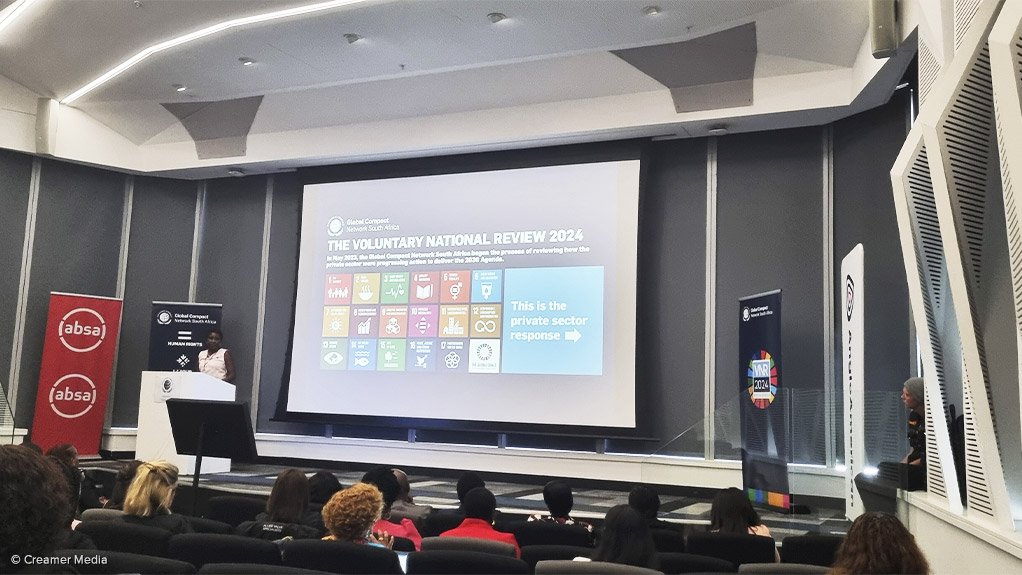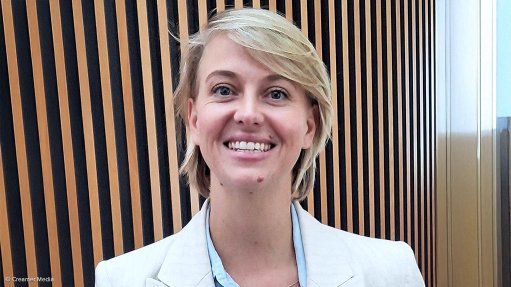Companies continue to prioritise SDGs related to decent work, economic growth
Business-led platform the Global Compact Network South Africa (GCNSA) has found that the UN Sustainable Development Goals (SDGs) relating to decent work and economic growth retained its position as the highest-ranking private-sector goal this year.
This was followed by the SDGs on climate action and partnerships to meet the goals.
The GCNSA on August 29 handed over its second and latest Voluntary National Review (VNR) on the UN’s 2030 Agenda to Minister in the Presidency for Planning, Monitoring and Evaluation Maropene Ramokgopa.
The VNR process allows countries to share and exchange experiences and lessons learned, as well as best practices and approaches on solutions to common challenges, all towards meeting the 17 SDGs.
South Africa’s first VNR was published in 2019, which was also facilitated by the GCNSA.
The latest VNR was informed by more participants – 132 companies and more than 300 individuals – thereby ensuring richer data, including through roundtable discussions, case studies and research.
GCNSA executive director Dr Achieng Ojwang explained that, in the latest iteration of the VNR, the private sector’s top ten priorities in terms of SDGs were decent work and economic growth; climate action; partnerships for the goals; good health and wellbeing; sustainable cities and communities; quality education; responsible consumption and production; industry, innovation and infrastructure; zero hunger; and reduced inequalities.
This compares with the top ten priorities in 2019, which were decent work and economic growth; quality education; responsible consumption and production; industry, innovation and infrastructure; good health and wellbeing; clean water and sanitation; affordable and clean energy; sustainable cities and communities; reduced inequalities; and climate action.
Ojwang commented that SDG 8 on decent work and economic growth remained the top priority for the private sector likely owing to the vital role that the private sector plays in contributing to the country’s economic prosperity and growing sustainable job opportunities.
SDG 13 on climate action rose eight places, which is a substantial shift upward that was likely driven by the increased local and global focus on climate change mitigation.
SDG 17 on partnerships to meet the goals also rose by eight places, which reflects the realisation that a multi-stakeholder response is required to manage the complexities of sustainability risks and opportunities.
Another big riser in the VNR this year was SDG 2 on zero hunger, which rose to the ninth-biggest priority, from sixteenth position in 2019. Ojwang said this reflected the negative impact of inflation on company stakeholders and the rising participation of companies contributing to food security.
Despite solid individual efforts having been made by companies to become more sustainable since 2019, Ojwang said the sustainability landscape remained fragmented and that more alignment among sectors and companies was necessary.
COMMENTARY
Ramokgopa reaffirmed the Government of National Unity’s commitment to taking doable and measurable action towards meeting the SDGs, as only limited progress had been made since 2012.
She also assured delegates attending the launch of the VNR that government was working on a more fit-for-purpose policy and that work on sustainable development has “only just begun”.
She further urged the private sector to consider the SDGs as a long-term roadmap for success.
As a contributing member to the VNR, Absa group chief strategy and sustainability officer Punki Modise pointed out how Absa had provided more than R84-billion in sustainable finance since 2021, with the bank aiming to meet a target of R150-billion of sustainable finance provided by 2025.
Modise said incorporating SDGs into business operations required strong leadership and that the private sector must consider itself as a catalyst for driving sustainable development.
Another VNR contributor, Anglo American external affairs and sustainability head Yvonne Mfolo, said the VNR provided an opportunity for reflection, learning and progress, with the GCNSA as the VNR facilitator having provided opportunities for deep engagement and knowledge-sharing between businesses.
Anglo American hosts its own series of SDG dialogues, with the seventh one due to take place later this year.
Mfolo said that the most important SDGs applicable to mining are partnerships for the goals; decent work and economic growth; climate action; and industry, innovation and infrastructure, but that responsible consumption and production, which involves recycling, requires greater attention and offers opportunity for circular economies within the industry.
“Waste is a resource that can benefit communities and support small businesses,” Mfolo explained, adding that SDG 5 on gender equality also needed more acceleration and efforts to get more women into senior leadership roles in mining.
For South Africa to meet its contribution to the SDGs, an all-of-society, -government, -business and -economy approach was needed, stated UN resident coordinator Nelson Muffuh.
He emphasised the importance of investing in young people, decarbonisation, green infrastructure and responsive institutions.
Muffuh concluded that the VNR reflected and reaffirmed South Africa’s commitment to advancing the 2030 Agenda for Sustainable Development in tandem with the country’s National Development Plan through a collective process involving different levels of government, academia, civil society and the private sector.
Article Enquiry
Email Article
Save Article
Feedback
To advertise email advertising@creamermedia.co.za or click here
Press Office
Announcements
What's On
Subscribe to improve your user experience...
Option 1 (equivalent of R125 a month):
Receive a weekly copy of Creamer Media's Engineering News & Mining Weekly magazine
(print copy for those in South Africa and e-magazine for those outside of South Africa)
Receive daily email newsletters
Access to full search results
Access archive of magazine back copies
Access to Projects in Progress
Access to ONE Research Report of your choice in PDF format
Option 2 (equivalent of R375 a month):
All benefits from Option 1
PLUS
Access to Creamer Media's Research Channel Africa for ALL Research Reports, in PDF format, on various industrial and mining sectors
including Electricity; Water; Energy Transition; Hydrogen; Roads, Rail and Ports; Coal; Gold; Platinum; Battery Metals; etc.
Already a subscriber?
Forgotten your password?
Receive weekly copy of Creamer Media's Engineering News & Mining Weekly magazine (print copy for those in South Africa and e-magazine for those outside of South Africa)
➕
Recieve daily email newsletters
➕
Access to full search results
➕
Access archive of magazine back copies
➕
Access to Projects in Progress
➕
Access to ONE Research Report of your choice in PDF format
RESEARCH CHANNEL AFRICA
R4500 (equivalent of R375 a month)
SUBSCRIBEAll benefits from Option 1
➕
Access to Creamer Media's Research Channel Africa for ALL Research Reports on various industrial and mining sectors, in PDF format, including on:
Electricity
➕
Water
➕
Energy Transition
➕
Hydrogen
➕
Roads, Rail and Ports
➕
Coal
➕
Gold
➕
Platinum
➕
Battery Metals
➕
etc.
Receive all benefits from Option 1 or Option 2 delivered to numerous people at your company
➕
Multiple User names and Passwords for simultaneous log-ins
➕
Intranet integration access to all in your organisation




















